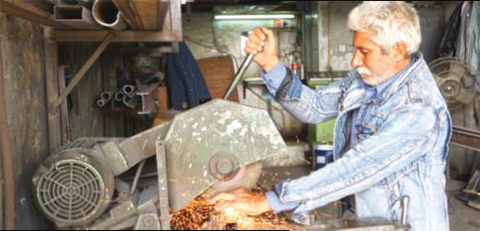 Blacksmith Abdullah Ghulam at work.
Blacksmith Abdullah Ghulam at work.Abdullah Ghulam, a 75-year-old Iranian blacksmith, has a passion and love for iron. Everything is very hands-on in his workshop, and even some of the tools he uses have been forged here. Ghulam allowed Kuwait Times into his workshop to see a demonstration of his work and the huge assortment of equipment, anvils and racks bristling with tools that have taken years to acquire.
Kuwait Times: What type of blacksmithing do you do? What do you make?
Ghulam: I have general knowledge of how to make and repair many things, from complex to simple objects. I take on pretty much anything that comes my way. I like making things that sell quickly.
KT: How and when did you get started in blacksmithing?
Ghulam: When I was in elementary school in Iran, my father started to teach me about blacksmithing, but I began actual work when I was 12 years old. My father made me learn more about blacksmithing to prevent me from causing trouble, and I did not like school anyway.
KT: What object or thing did you use as your first anvil?
Ghulam: My first anvil was my father’s Mousehole Forge anvil back in Iran.
KT: Tell us about your first creation?
Ghulam: My first creation was a laundry dry rack made of iron.
KT: Who assisted you or encouraged you?
Ghulam: I was encouraged by my father till he died. But my sons and my grandsons hate my work as a blacksmith - they always tell me that I smell like iron.
KT: What event changed your attitude about blacksmithing?
Ghulam: Nothing changed anything; only that I want to learn more.
KT: What tools has changed or made your life easier in the shop?
Ghulam: The tools that have made the greatest difference in the shop are better hammers, a knife grinder and bandsaw.
KT: What advice would you give to those starting out in blacksmithing?
Ghulam: I doubt anyone is interested in blacksmithing nowadays because it is a dying job, but the best advice I can give is to learn the basics of metal work before jumping into more specialized work. Learn about hammer blows and fire control and wear hearing protection and goggles, because this job could be dangerous. Apprentices need to know the process before they can put machinery in the mix.
KT: What are some of the interesting things that have happened to you in your life as a blacksmith?
Ghulam: I do not look at things the same way again. I only notice iron objects and wonder what I could have done if I had made them.
By Faten Omar










